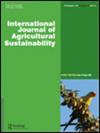粮食之战:揭示中国耕地利用从粮食向非粮食的转变?
IF 3.3
2区 农林科学
Q1 AGRICULTURE, MULTIDISCIPLINARY
International Journal of Agricultural Sustainability
Pub Date : 2023-10-06
DOI:10.1080/14735903.2023.2262752
引用次数: 0
摘要
中国就其在保障食品安全方面面临的“前所未有”障碍发出警告。大量非粮食耕地正在加剧这种情况,迫切需要调查其根本原因。尽管如此,以前的研究表明缺乏村庄层面的分析,并且由于计量经济学方法的偏见而受到损害。为了弥补这一点,本文采用了一种复杂的方法,将计量经济学建模和机器学习技术相结合,以揭示村庄层面的复杂驱动力。这项研究有三个主要发现。首先,耕地可得性、贫困率和村干部年龄对耕地非粮食利用产生不利影响。其次,农村劳动力老龄化、收入水平等多重因素对非粮食作物种植产生正向影响,且影响显著增强。最后,重要的是要认识到,影响因素对所研究的空间尺度具有敏感性。村级研究提供了一个全面的概述,超越了个别家庭的决定。总的来说,这项研究强调了将基本原则纳入政策制定的必要性。乡镇和县政府应该根据确定的村级驱动因素制定指导方针、政策和法规,而不是仅仅依靠家庭层面的决定因素。本文章由计算机程序翻译,如有差异,请以英文原文为准。
The battle of crops: unveiling the shift from grain to non-grain use of farmland in China?
China is issuing a warning regarding the ‘unprecedented’ hurdles it faces in safeguarding its food security. The substantial conversion of farmland for non-grain cultivation is exacerbating the situation, necessitating urgent investigation into the underlying causes. Nonetheless, previous studies have revealed a dearth of village-level analysis and have been marred by a bias stemming from econometric methodologies. To remedy this, the present paper employs a sophisticated approach combining econometric modelling and machine learning techniques to unravel the intricate driving forces at the village level. The study yields three principal findings. Firstly, the availability of farmland, poverty incidence, and the age of village leaders exert a detrimental influence on non-grain use of farmland (NGUF). Secondly, a conglomerate of factors, such as the aging rural workforce, income levels, positively impact the planting of non-grain crops, with remarkably increasing effects. Finally, it is pivotal to acknowledge that the influencing factors display sensitivity to the spatial scale examined. Village-level research provides a comprehensive overview, transcending individual household decisions. Collectively, this study underscores the indispensability of incorporating the underlying principles into policy formulation. Township and county authorities should craft guidelines, policies, and regulations in accordance with the ascertained village-level drivers, rather than relying solely on household-level determinants.
求助全文
通过发布文献求助,成功后即可免费获取论文全文。
去求助
来源期刊

International Journal of Agricultural Sustainability
AGRICULTURE, MULTIDISCIPLINARY-GREEN & SUSTAINABLE SCIENCE & TECHNOLOGY
CiteScore
5.90
自引率
23.50%
发文量
33
审稿时长
>12 weeks
期刊介绍:
The International Journal of Agricultural Sustainability ( IJAS) is a cross-disciplinary, peer-reviewed journal dedicated to advancing the understanding of sustainability in agricultural and food systems.
IJAS publishes both theoretical developments and critical appraisals of new evidence on what is not sustainable about current or past agricultural and food systems, as well as on transitions towards agricultural and rural sustainability at farm, community, regional, national and international levels, and through food supply chains. It is committed to clear and consistent use of language and logic, and the use of appropriate evidence to substantiate empirical statements.
IJAS increases knowledge on what technologies and processes are contributing to agricultural sustainability, what policies, institutions and economic structures are preventing or promoting sustainability, and what relevant lessons should be learned.
 求助内容:
求助内容: 应助结果提醒方式:
应助结果提醒方式:


